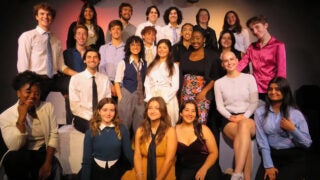
The user must restore life on a small planet in ElemenTerra. (Photo/Max Pittsley)
The future of video game education: turning student projects into full-fledged companies
The USC Games Bridge Program can help students make successful transitions to the real world of game development
A new program at USC is taking student video games to the corporate level.
The USC Games Bridge Program, which began this summer, was created to turn student games into companies primed for venture capitalist investment or acquisition. Its innovative approach and elite mentorship program is changing how potential employers recruit and how new games will be developed.
Three teams of Bridge students are receiving legal mentorship to structure their company; business mentorship by venture capitalists, executives and publishers; and insights from games industry leaders. They’ll be working throughout the summer to develop games and perfect their pitch to future venture capitalists to invest in or acquire their company.
“Over the years we’ve seen a lot of great teams graduate from USC and start successful game companies,” said USC Games Director Tracy Fullerton. “Thatgamecompany, The Odd Gentlemen, Survios and Giant Sparrow are just few of these companies that have gone on to release critically acclaimed commercial games. The Bridge has been set up as a formal way of helping our student teams make successful transitions to the real world of game development.”
No prototypes
This is the future of video game education: turning student projects into full-fledged companies. But the USC Games Bridge program is unlike accelerators found in other college game design programs for three reasons:
- Students create companies, not prototypes.
Bridge program students, most of whom are recent graduates, are not merely developing prototypes; they’ve already done that in the USC Games Advanced Games class. Their focus is on creating a company and pitching their game to venture capitalists and game publishers.
- Dream team mentorships.
The USC Games Bridge program is the only one of its kind to pair students with mentors such as Paul Bellezza (product manager, Riot Games); Laird Malamed (chief operating officer, Oculus VR); Greg Rice (brand manager, Double Fine) and Josh Scherr (lead cinematics animator, Naughty Dog). The program is led by Gordon Bellamy, former executive director of the Academy of Interactive Arts and Sciences and the International Game Developers Association, and Samuel Roberts, one of the founding directors of the Indiecade festival and a founding partner of Codename Games.
USC devotes its resources to supporting this new generation of the best and brightest game creators.
Gordon Bellamy
“USC devotes its resources to supporting this new generation of the best and brightest game creators. Sam Roberts and I collaborate and leverage our experience to cultivate them into valuable independent game studios where the developers can thrive as owners of their vision,” Bellamy said.
- Success begets success.
Unlike accelerators, which take an interest in the company, USC Games has no ownership over the students’ company, Fullerton said. However, if the students’ company is successful and makes at least $500,000, 1 percent will go back to USC Games to re-fund the Bridge program for future cohorts.
“We’re not making a formal investment in them and we’re not taking a percentage of their company,” Fullerton said. “We’re just helping them to get things started. We want these companies to be clean slates so that they still are very attractive to other incubators and investors.”
Demo Day games
Three games were selected among 36 applicants to participate in this inaugural version. ElemenTerra, a virtual reality, world-building adventure in which the user must restore life on a small planet; Chambara, winner of the 2015 “Ones to Watch” Award at the British Academy of Film and Television Arts video game awards; and Howie & Yarla, a top-down 2-D action game.
Of Howie & Yarla, Fullerton said, “You can see that kind of character having legs into cartoons and comic books. In this case, what these students are building is not just a game company, but a transmedia company — a company that’s really understanding of gaming from a next-gen perspective.”
Each game has been featured in USC Games’ Demo Day, a biannual exhibition in which USC students premiere the program’s most innovative games of the semester.
“We have all these tremendous student teams and they make fantastic games. People get very excited about them on Demo Day, but then there’s that moment of dissolution: They graduate, they go home, the band breaks up,” Fullerton said. “We think of this new program as a ‘bridge’ from here to there.”



